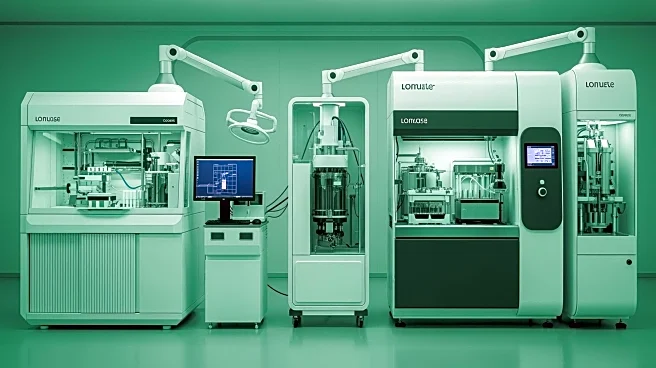What's Happening?
The biopharmaceutical industry is increasingly focusing on sustainability by adopting new single-use plastics that are more environmentally friendly. Joel Eichmann, co-founder and managing director of
Green Elephant Biotech, emphasizes the importance of integrating sustainability into the core operations of biopharmaceutical manufacturing. The industry, responsible for a significant portion of global greenhouse gas emissions, is under pressure to reduce its environmental footprint. Eichmann highlights that using bio-based, recyclable materials like polylactic acid (PLA) can significantly lower emissions compared to traditional fossil-based plastics. This shift is part of a broader effort to improve resource efficiency, reduce waste, and comply with emerging regulatory frameworks such as the European Green Deal.
Why It's Important?
The move towards sustainable manufacturing in the biopharmaceutical sector is crucial for both environmental and economic reasons. By adopting greener practices, companies can achieve cost savings through better control over energy, water, and waste streams. This not only reduces operational costs but also enhances compliance with environmental, social, and governance (ESG) standards. As regulations tighten and energy prices rise, sustainable practices offer a competitive advantage by improving margins and ensuring long-term operational resilience. The transition to sustainable materials and processes is not just an environmental imperative but also a strategic business decision that aligns with global efforts to combat climate change.
What's Next?
As the biopharmaceutical industry continues to embrace sustainable practices, companies are likely to invest more in research and development of alternative materials and technologies. This could lead to innovations in manufacturing processes that further reduce environmental impact. Regulatory bodies may also introduce stricter guidelines to ensure compliance with sustainability goals, prompting companies to accelerate their transition to greener practices. Stakeholders, including investors and consumers, are expected to increasingly demand transparency and accountability in sustainability efforts, influencing corporate strategies and market dynamics.
Beyond the Headlines
The shift towards sustainable single-use plastics in biopharmaceutical manufacturing reflects a broader cultural and ethical shift towards environmental responsibility. This transition challenges traditional manufacturing paradigms and requires a reevaluation of supply chains, material sourcing, and waste management practices. It also highlights the interconnectedness of health and environmental issues, as the industry's environmental impact directly affects public health outcomes. By prioritizing sustainability, the biopharmaceutical sector can contribute to a healthier planet and society, setting a precedent for other industries to follow.








